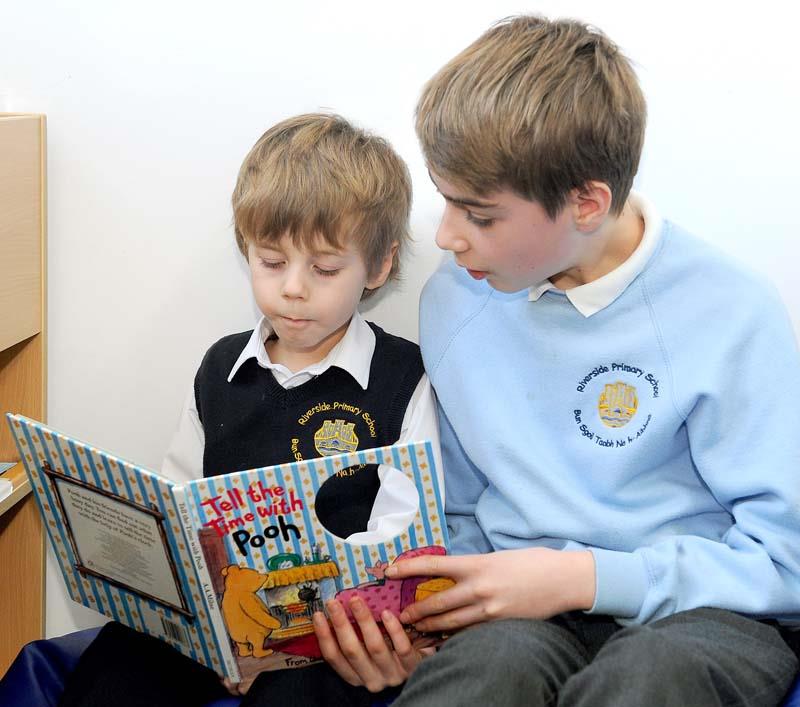
For most primary school age children, activities such as attending assembly, playing in the playground, or eating lunch are simply part of their daily routine. For children with autism, however, even the prospect of navigating these cornerstones of the school day can sometimes feel like being presented with endless hurdles to overcome.
Three years ago at Riverside Primary School in Stirling, Scotland, our staff and pupils launched the AP Gang – a unique initiative aiming to change the lives of children in the school’s autism provision.
This simple but highly effective programme aimed to empower and involve older pupils in the daily lives of our children with autism. Little did pupils and staff know three years ago how much this initiative would not only improve the experiences of our autistic children, but also better integrate all pupils with the autism facility and even encourage the whole school to stop thinking about the challenges associated with the autism provision and start celebrating the diversity of our school community.
So, how did this initiative come about? Riverside is a particularly large and unique primary school encompassing 15 mainstream classes, three Gaelic medium education classes, two nursery classes and four autism provision classes. Riverside has a very inclusive ethos, seeing all children within the school as part of our community, including, of course the 23 children in the autism provision.
Three years ago, I became the new headteacher and wanted to give all of our Primary 7 pupils a strong voice within the school in order to develop their leadership skills as well as skills for life, learning and work.
This marked the beginning of the Senior Sevens Initiative. Since then, all children in Primary 7 apply to be a member of a different leadership group. The roles on offer are diverse but one thing they share is that they will all give these 11 and 12-year-old pupils the chance to have a direct impact on the life of the school. These groups include: Pupil Council, Tech Team, School Website Group, Publicity Group, Eco Committee, Fair Trade Group and the AP Gang (Autism Provision Gang).
It is a marker of the inclusive nature of the school community that the AP Gang is consistently the most popular group for applications within the Senior Sevens initiative and is three times larger than most of the other leadership groups.

The AP Gang
The initiative is led by Sandra Craig, the principal teacher of additional support needs, and supported by the staff within the provision but, crucially, it is also run by the eager group of 12 to 13 Primary 7 pupils. This key pupil involvement echoes the strong values of inclusion and acceptance promoted throughout the school.
The AP Gang is tasked with promoting acceptance and understanding of autism within the community. Of course, this is no small task. However, these children are part of a school community which believes in supporting everyone, in the school and beyond, to develop their understanding of autism. The efforts of this group of pupils to support children with autism in various aspects of school life may seem simple, but they really do make a difference.
For example, pupils of the Riverside AP Gang might be found in the morning supporting children with autism during assemblies by keeping them calm and engaged. Later, you might find the AP Gang in the playground encouraging children with autism to play games with other pupils, or to participate in small group activities.
You will always find them sitting with the children at lunchtime, chatting away with them and encouraging them to try new foods. Members of the AP Gang often choose to give up their own free time to visit the autism provision and interact with the children in their own environment too.
These small steps could seem somewhat simple but their effects are diverse and invaluable: promoting positive role-models, supporting children’s sensory needs, developing key social skills and slowly pushing children out of their comfort zone in a safe and inclusive manner.
Key to the success of this initiative is the encouragement and empowerment of AP Gang pupils to take responsibility for the programme. For example, pupils have also helped the children in the autism provision to run their own community café.
The café not only benefits the pupils, who continue to develop life-skills, but also their wider support network. The café invites families of children with autism to come and socialise in a non-judgemental environment that celebrates the diversity of each individual child on the spectrum. It is a friendly and welcoming meeting place for parents and carers to support each other and to develop links with the wider community.
The autism provision staff work hard to provide opportunities for the children with autism to gain new skills or transfer their learning into real-life contexts. The AP Gang supports this initiative and members develop their own skills of leadership, while also learning how to support someone with autism in the world of work and advocacy for autism.
Indeed, the positive effects of the AP Gang are starting to have an impact beyond our local community at Riverside. Recently, the AP Gang was invited to visit another school with an autism provision in order to show them how to set up an AP Gang and to explain how the project works.

We were also very proud this year when our AP Gang were nominated for an Autism Professional Award in the category of Inspirational Education Provision. Although we were not overall winners, we were the only school in Scotland to be nominated and, more importantly, such achievements foster a sense of team-work and success in the provision and throughout the school. All children involved, as well as staff and parents, are very proud of the work done by the AP Gang and have been humbled to see their efforts recognised on a national level.
The understanding and acceptance of autism within the school and local community is incredible. Children throughout the school are keen to learn about autism and often ask how they can help support a child within the school.
Parents of the children with autism have been overwhelmed by the response within the community, particularly outside school hours. Children will call their child by name, invite them to play in the park and say hello to the parents – small actions that make a world of difference to families who in the past may have experienced a rather different reaction in public places.
Parents from the provision have commented on how lovely it is to feel a part of the community and know that their child is accepted for who they are. The sharing of knowledge, strategies and giving explanations of behaviour have allowed our pupils at Riverside to gain a better understanding of autism.
The AP Gang not only educates children about autism, but it is also encouraging lifelong learning: children are going home and educating their parents and grandparents. It is hoped that, by continuing to promote understanding and awareness, a community of acceptance and safety can be created for the future of our children with autism. It is also hoped that, long-term, we are helping to develop a workforce of potential employers that can see the strengths that someone with autism can bring to a job.
Some of the children have even shown enthusiasm at the prospect of becoming teachers within the provision in the future. The only way forward is to construct an environment of understanding and acceptance. The AP Gang is our small, yet somehow mighty, attempt at contributing to the creation of such a world.
- Kay Robertson is headteacher of Riverside Primary School in Stirling. Riverside Primary and the AP Gang were finalists in the Award for Inspirational Education Provision – Primary School category at this year’s Autism Professional Awards run by the National Autistic Society.
